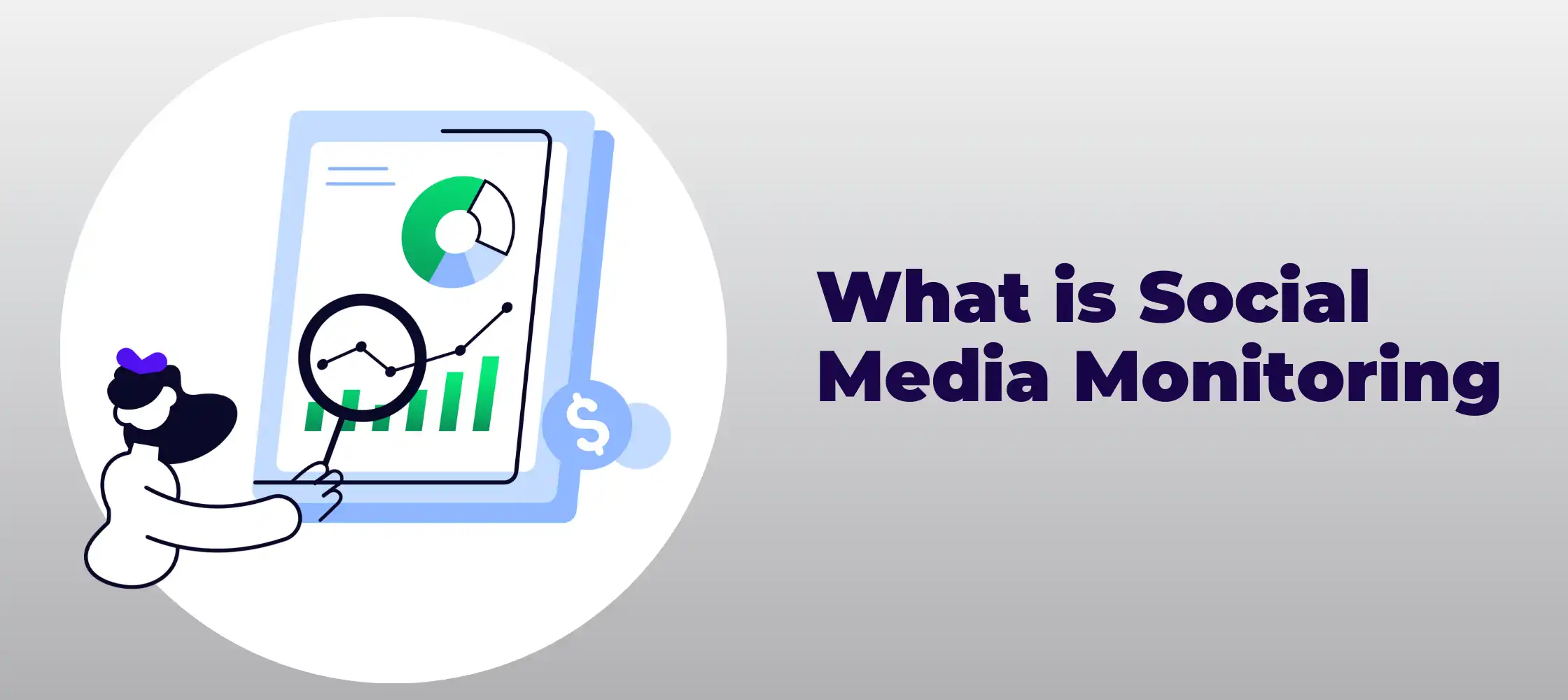People spend a lot of time online sharing their thoughts, opinions, and impressions of products, services, and brands across all social media platforms. Social media is a great tool to learn about customers as they comment, post, and share content on social media. Brands having active customers on social media would benefit from taking the time to listen to them and gather data with the use of social media monitoring tools.
The Definition of Social Media Monitoring
Social media monitoring is the process of finding, identifying, and analyzing what is being said on social media about an individual, a brand, its products, services, industry, or competitors. The continuous monitoring of online conversations is done on social media, but also on the entire web with forums, blogs, news sites, and communities.
Even if they sound alike, there is a difference between social media monitoring vs moderation. Social media monitoring is about listening to online conversations relevant to a brand, while moderation is about getting involved in the discussion. Social media monitoring helps brands find a plethora of useful information and data about their customers to know where, who, and how people are talking about a specific brand, product, service, or industry on social media.
How Does Social Media Monitoring Work?
Social media monitoring offers a lot of benefits to brands who use it and implement it into their social media marketing strategy. People enjoy speaking their minds on social media. Social media monitoring has become a great tool for businesses seeking to learn more about their customers, improve or pursue their product development, their marketing strategy, or even their content creation.
Examples & use cases
The importance of social media monitoring is undeniable as it can help brands get a lot of useful data for metrics and analysis, as well as inspirations for social media marketing campaigns strategies and content creation.
Here are some examples of what social media monitoring can help you achieve:
- Sentiment analysis: Understand how users feel about specific online conversations (negative, positive, or neutral).
- ROI (return on investment): Identify if and how your money is paying off.
- Hashtags and keywords: Find the right ones to improve your social media strategies and attract new customers.
- Trends: Identify popular themes, memes, songs, and topics in real time and how your brand could jump on some of them to attract business.
- Share of voice: Understand the percentage of online conversations that are about your brand vs your competitors.
Importance of Social Media Listening for Organizations
Organizations using social media listening understand customers’ opinions and are able to identify new opportunities, collect feedback from customers and find data about their competitors. Social media listening is also a great tool to provide high-quality customer service, optimize communications, accelerate product development, and improve overall marketing and PR strategy.
Benefits of Monitoring Your Social Media Platforms
Social media offer a great platform for brands to connect with their audience and promote their products and services. The huge amount of user-generated content created each day on the different social media platforms and websites offer huge benefits to brands using social media monitoring to its full potential.
Brand awareness
Social media monitoring is a great tool to protect your brand reputation and improve brand awareness. It enables you to be aware in real time of what customers think and say about your brand on social media while allowing you to be able to reply to them on the spot.
Engage the right audience
Strong and meaningful relationships with the audience lead to more engaged customers and create fidelity among your online audience. Social media monitoring allows you to exchange with them, identify topics and trends they are interested in, as well as learn more in-depth about your audience’s needs.
Competitor analysis
Your competitors are a great source of information and data to help your brand improve and stay on top. With social monitoring, your brand is able to know what they are up to, understand what works best for them to see what could work for your brand, and learn from their mistakes.
Market research
Monitoring helps you stay on track of trends and customers’ sentiments or experiences. Your brand is able to know what your customer thinks and feels about your brand products or services, which enables you to adjust at any moment according to how the data changes to evolve with your market.
Receive better insights from your audience
Customers can offer useful insights and feedback on social media directly by tagging your brands or via hashtags. You can easily test out how your audience responds to each message, product, or content to identify quickly what works best to create more curated and efficient content, as well as high-demand services or products.
How to Do Social Media Monitoring?
The best way to use social media monitoring to achieve your social media goals is to build a strong social media strategy while keeping in mind the next few steps to get you situated.
Set goals and metrics
Your goals reflect what you want to achieve as a brand on social media. You can set achievable social media metrics with specific numbers (likes, shares, mentions, sales) to help you keep track of your progress.
Choose the proper tools
The right social media monitoring tool for your brand fits your channel needs, as well as your team resources and experience. The proper tool should help you shuffle through all the social media content, gather the data you need and analyze it.
Set up your searches
Your search terms can include a variety of words according to your brand, products, services, and industry. Those terms should include the names and words people use when they talk about your brand online, such as:
- Your brand name and hashtags
- Your products and services names
- Slogans
- CEO, spokesperson, and mascot name
- Branded hashtags
- Industry, location, and community hashtags
- Competitor hashtags and products
Make sure to include any derivatives, including recurring spelling errors of your name, products, services, or hashtags to make sure you don’t miss any mentions or conversations.
Monitor relevant platforms
Your audience might prefer and be more active on some platforms rather than others. Your brand focus should be to monitor the platform that makes sense for your brand and where you are active online, as well as any online communities or group chats that might include people that discuss your brand or products.
Set alerts
Alerts can be set for your social media team to be notified of any changes or combination of changes on your social media platforms, ranging from sentiment changes and new products from competitors to a spike in comments.
Analyze and act on the data
Social media monitoring is a continuous and never-ending process. Your brand strategy should include regular checks of your social media search term and adjustment to them to match any product launch, competitor changes, new trends, or even industry changes. Your social media strategy will evolve to follow any shortcomings and areas that could be improved to ensure your brand growth.
Choosing the Proper Social Media Monitoring Tool
Social media monitoring can help your brand learn about people’s thoughts and impressions about your brand, products, services, industry, and even competitors. With the right social listening tool, social monitoring will help you improve your brand awareness and receive useful insights from your customers.
Book a meeting with us to learn more about how our 24/7 social media listening and monitoring team can help your brand reach its full potential.

